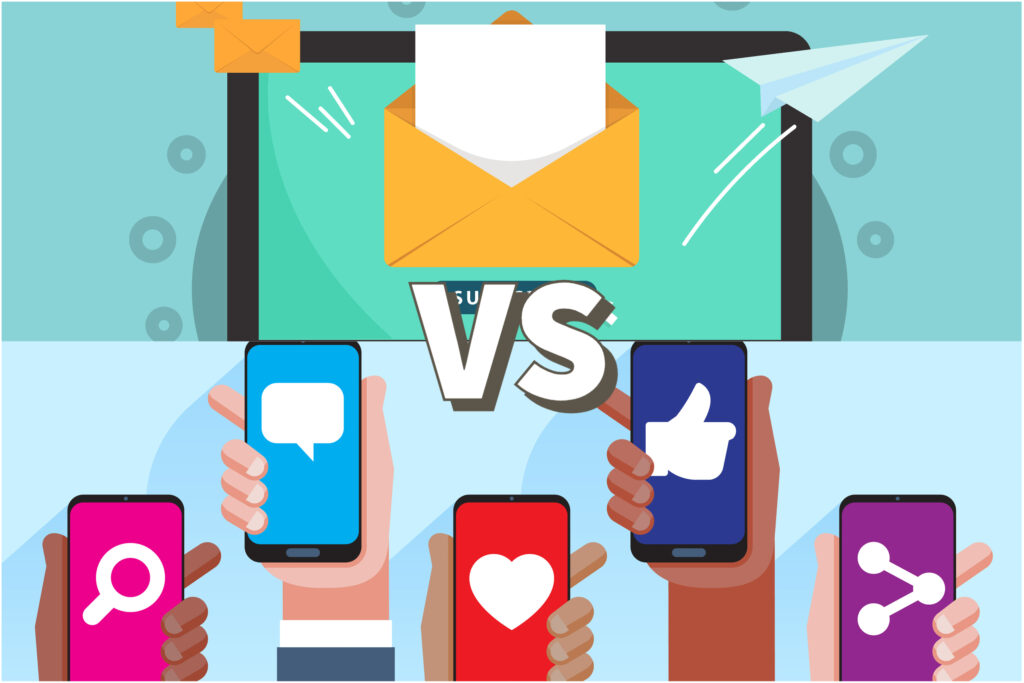In today’s digital age, businesses have a wide range of marketing channels at their disposal, including email marketing and social media marketing. Both channels offer unique advantages and can be effective in different ways, depending on your business goals and target audience. In this article, we’ll explore the pros and cons of email marketing and social media marketing, and help you determine which channel is right for your business.
Email Marketing: Pros and Cons
Email marketing is one of the oldest and most established forms of digital marketing, and for good reason. Here are some of the advantages and disadvantages of email marketing:
Pros:
- High Return on Investment (ROI): Email marketing consistently generates a high ROI compared to other marketing channels, with an average ROI of $42 for every $1 spent.
- Direct communication with your audience: Email marketing allows you to communicate directly with your subscribers and build a one-to-one relationship with them.
- Targeted and personalized content: With email marketing, you can segment your email list and personalize your content based on subscriber behavior and interests.
- High conversion rates: Email marketing has a high conversion rate, with subscribers more likely to make a purchase after receiving an email.
Cons:
- Risk of spam: With so many emails flooding inboxes, there is a risk that your emails will be marked as spam and not seen by your subscribers.
- List fatigue: If you send too many emails or irrelevant content, your subscribers may get tired of your emails and unsubscribe.
- Limited reach: Email marketing only reaches your existing email list, so it can be challenging to reach new audiences.
Social Media Marketing: Pros and Cons
Social media marketing has exploded in popularity in recent years, with businesses using platforms like Facebook, Instagram, and Twitter to connect with their audiences. Here are some of the pros and cons of social media marketing:
Pros:
- Wide reach: Social media platforms have a vast audience, making it easier to reach new customers and expand your brand’s reach.
- Engaging content: Social media platforms offer a range of media formats, including videos, images, and GIFs, allowing you to create engaging and visually appealing content.
- Viral potential: Social media content has the potential to go viral, reaching a much larger audience than you might reach through other channels.
Cons:
- Less direct communication: Social media communication is often one-to-many, meaning it can be challenging to build a one-to-one relationship with your audience.
- Algorithm changes: Social media platforms frequently change their algorithms, which can affect your organic reach and make it more challenging to reach your audience.
- Lower conversion rates: While social media can drive traffic to your website, it has a lower conversion rate compared to email marketing.
Which Is Better: Email Marketing or Social Media Marketing?
Ultimately, the choice between email marketing and social media marketing depends on your business goals and target audience. If you’re looking to build a direct relationship with your subscribers, personalize your content, and drive high conversions, email marketing may be the best option for you. On the other hand, if you’re looking to reach a wider audience, create engaging content, and drive traffic to your website, social media marketing may be a better fit.
Of course, many businesses use both email marketing and social media marketing to achieve their marketing goals. By leveraging the unique advantages of each channel, you can create a comprehensive marketing strategy that reaches your audience wherever they are and drives results for your business.



